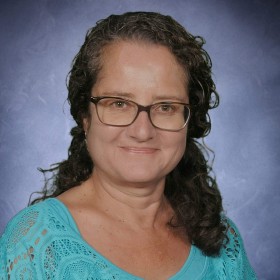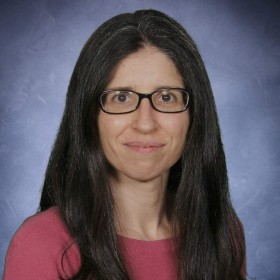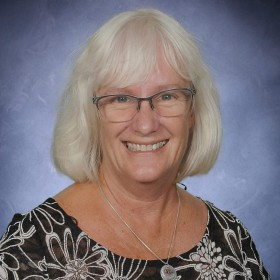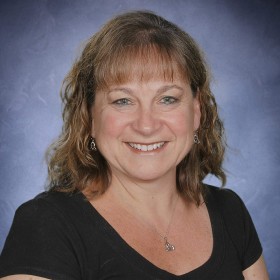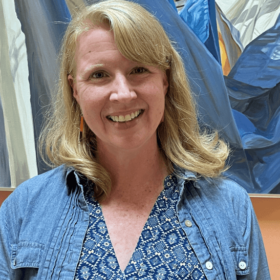Initiative Strives to Offset Barriers to College Completion
PORTSMOUTH –The mission of the Center for Academic
Planning & Support (CAPS) at Great Bay Community College is to
create a responsive learning environment for all students. Thanks to
grant funding and other partnerships, the center is able to adapt its
work to the shifting needs of students and to provide easy access to
multiple sources of information.
Through a grant from the New Hampshire Charitable Foundation, which
partially funds a position, and hiring of an AmeriCorps VISTA through
Campus Compact NH, staff members Jody Mancini and Kimberly Cartier have
collated and posted online resource information for students across the
make-up of Great Bay’s increasingly diverse student body. The resources
focus on a range of real-world issues in addition to academics – housing
and transportation, for example – that impact young students and
lifelong learners alike, and offers information toward solutions.
The impetus for gathering these resources was the recognition that
many at-risk and low-income students needed help to stay in school and
succeed, said CAPS Director Sharon Cronin. Through the NH Charitable
Foundation grant, GBCC has been partnering with Portsmouth Housing
Authority, Portsmouth High School, and Portsmouth Adult Education. “Our
research shows that students from Portsmouth Housing do well
academically, but are not likely to complete their programs. We wanted
to know, what are the barriers to completion? If not academics, what are
the things getting in the way?” Cronin said.
As barriers were explored and resources identified, we realized many
of those barriers apply to other students as well, Cronin said, and we
wanted to get information on the website to be readily accessible to
both current students and those considering Great Bay. CAPS now has a
Student Resource Guide regarding GBCC academic topics on their College
Readiness page at http://www.greatbay.edu/student-services/academic-support/college-readiness and numerous community resources to support a wide range of needs on a new page at http://www.greatbay.edu/student-services/community-resources. Having a list of resources all in one place is just one more way to facilitate a more manageable college experience.
In another new initiative, the new AmeriCorps VISTA in CAPS is
creating a peer-mentoring program to help students transition to
college. “We have found that a lot of students apply, but do not make it
through the process, especially if they are first generation students
to college,” Cronin said. “We are hoping a peer-mentoring program will
help guide them through that process and the first year of college.”
CAPS is a multi-service center at GBCC supporting the academic needs
of all credit-bearing students with free tutoring, academic counseling
and placement testing, as well as specialized support for students with
disabilities and international students, and a computer lab and career
center for all. “We started as a tiny support area in the library back
on the old Stratham campus with tutoring and disability services. We
grew into a full center in 2002 and now we have a staff of eight, as
well as several professional tutors, and many student workers,” Cronin
said.
Still, CAPS would like to see more students be aware of and make use
of the resources and services available to them at GBCC. To that end,
CAPS adheres to the National Association of Student Success
motto: Helping underprepared students to prepare, prepared students to
advance, and advanced students to excel.
Great Bay Community College is a comprehensive postsecondary
institution offering quality academic and professional and technical
education in support of workforce development and lifelong learning.
Great Bay Community College is part of the Community College System of
New Hampshire, a public system of higher education consisting of seven
colleges in Berlin, Claremont, Laconia, Concord, Manchester, Nashua, and
Portsmouth. The colleges offer Associate degrees and career training in
technical, professional and general fields, including transfer pathways
to baccalaureate degrees. The college’s second campus in Rochester
offers academic courses and a degree program in Advanced Composites
Manufacturing. For more information on Great Bay Community College,
visit www.greatbay.edu
Rochester and Portsmouth, NH – Recognizing that many of its students work full time and need flexibility to further their education, Great Bay Community College (GBCC) has added morning classes for its Advanced Composites Manufacturing Certificate. This change will enable those individuals working the second or third shift to attend classes and directly benefits many employees at Safran Aerospace Compositesin Rochester.
The program is being run out of Great Bay Community College’s Advanced Technology and Education Center in Rochester. It builds upon the full-time day and evening options, which have been in place since 2013. The academic programming was developed in conjunction with Safran’s move into Rochester in 2012 and their plans to begin hiring technicians in 2013. The relationship between GBCC and Safran also includes customized training for incumbent workers. In addition, all students are taken on a tour of Safran’s facility during their first semester and are guaranteed an interview upon completing the certificate program.
“We wanted to ensure that individuals who do not work conventional hours have access to educational programming that can help them advance in their profession. We know this is attractive for companies such as Safran and BAE systems, but the advanced manufacturing skills that are incorporated into our program can benefit many manufacturers,” said Debra Mattson, advanced manufacturing program director at GBCC’s Technical and Academic Center.
The Advanced Composites Manufacturing Certificate is a 24-credit program. Students can go on to earn an Associate degree in Technical Studies, using the certificate as their Technical Specialty. After completing the Associate degree, students may opt to continue on at one of the schools that have articulation agreements with GBCC to earn a Bachelor’s degree.
“GBCC’s decision to offer morning classes will greatly benefit Safran employees interested in furthering their career in advanced composites and manufacturing. The course offerings provide a great level of flexibility to those who work off-shifts, such as those on the weekends or 2ndand 3rdshifts,” said Jillian Colley, training and development coordinator at Safran.
Learn more about GBCC’s Advanced Composite Manufacturing Certificate and its new scheduling options at greatbay.eduor contact Advanced Manufacturing Program Director, Debra Mattson at [email protected] 603-427-7732.
About Great Bay Community College
Great Bay Community College is a comprehensive postsecondary institution offering quality academic and professional and technical education in support of workforce development and lifelong learning. Great Bay Community College is part of the Community College System of New Hampshire, a public system of higher education consisting of seven colleges in Berlin, Claremont, Laconia, Concord, Manchester, Nashua, and Portsmouth. The colleges offer Associate degrees and career training in technical, professional and general fields, including transfer pathways to baccalaureate degrees. The college’s second campus, the Advanced Technology & Academic Center is now open in Rochester offering academic courses and a degree program in Advanced Composites Manufacturing. For more information on Great Bay Community College, visit www.greatbay.edu.
Original Stories: https://www.compositesworld.com/news/community-college-adds-flexibility-for-advanced-composites-manufacturing-students & https://www.seacoastonline.com/news/20190205/great-bay-adds-new-classes-in-advanced-composites-program
PORTSMOUTH – A popular class at Great Bay Community College is helping students differentiate their passions from their passing interests so they can make smarter decisions about their careers. Introduction to Ethnography: The World of Work, which the college introduced last year, approaches the working life as a cultural system of norms, said Dr. Aimee Huard, chair of social science at Great Bay. Students explore careers through the cultural meaning entrenched in workplace expectations and values.
Students use anthropological research techniques to evaluate myths and stereotypes and gain insight into why work matters and what motivates people who are successful in their careers. Through their own research based on interviews with working professionals, students have an easier time seeing the difference between a job and a career, Huard said.
“Students often will just pick a major based on what interests them at the moment and not necessarily what will suit them well for a career. This class helps them identify interests and how those interests translate into a career they might not have considered. In the vast majority of time, by the end of this course, 85% of the students know what they want to do, have confirmed a career path, or have determined that they should not pursue what they thought they wanted to,” she said.
Based on a similar class that Huard introduced at Nashua Community College, the four-credit class is required for all students in liberal arts who have not selected a concentration or major. It replaces a previous first-year seminar class. It also satisfies a Social Science elective, and its 4 credits are eligible for transfer to the University of New Hampshire through a liberal arts pathway.
The goal of the class is to help students make informed decisions about majors and career paths and plan their educations as efficiently and cost-effectively as possible. Huard sees many students who choose a major without giving full consideration to all it involves and what a career or job in that field entails. By the time students decide to try something else, they’ve made an investment of tuition and coursework, she said.
The class examines the working life in the context of contemporary dynamics of disruptions, uncertainty, innovation and diversity. Through their assignments, students reflect on their own interests, passions and motivations so they more easily translate their personal likes and dislikes into a career, Huard said.
Ethnography refers to the study of people and cultures where the researcher makes observations from the perspective of the subject of the study. For this class, students interview journalists, politicians, chemical engineers, computer coders, educators and others. They ask about details of the job and the skills required to do it well, as well as personal passions and motivations. They talk about salaries, working hours, job security and other issues that influence happiness and longevity in a career.
Taylor Italia, a liberal arts major, said Ethnography of Work has helped her think more holistically about her life and career. “The class has made me think so much about my future, which I have always had a hard time with,” said Italia, who lives in Kensington. “I would describe it as one of those classes that isn’t textbook. It has taught me so much about the real world, “A lot of the work was based on conversation and what came out of that was thought provoking.”
Because of the class, she is considering careers in journalism or fashion, which are subjects she hadn’t considered before.
She enrolled at Great Bay because it was an economical way to collect her general education credits while sorting out her major and careers options at her own pace without incurring what she calls “crazy debt.”
Huard launched the class at Nashua Community College in 2016, loosely modeling it on a similar initiative at Guttman Community College in New York City and designing it to align with New Hampshire resources and careers. She set up the class at Great Bay in 2017, and joined the Great Bay faculty this academic year, moving to Portsmouth from Nashua.
Students can learn more about the course at www.greatbay.edu or by attending an Open House on January 19th from 4-6PM at the College’ Portsmouth or Rochester campuses.
Great Bay Community College is a comprehensive postsecondary institution offering quality academic and professional and technical education in support of workforce development and lifelong learning. Great Bay Community College is part of the Community College System of New Hampshire, a public system of higher education consisting of seven colleges in Berlin, Claremont, Laconia, Concord, Manchester, Nashua, and Portsmouth. The colleges offer Associate degrees and career training in technical, professional and general fields, including transfer pathways to baccalaureate degrees. The college’s second campus, the Advanced Technology & Academic Center is now open in Rochester offering academic courses and a degree program in Advanced Composites Manufacturing. For more information on Great Bay Community College, visit www.greatbay.edu.
Original Story: Seacoastonline – https://www.seacoastonline.com/news/20190113/new-gbcc-course-helps-students-identify-career-path
by Lisa Proulx
Fundraiser Celebrates UNH – GBCC Collaborations Under University President’s Leadership
PORTSMOUTH – Great Bay Community College will host its sixth annual Distinguished Leaders Award reception on Oct. 12, beginning at 6:30 p.m. The annual fundraiser highlights the relationship between the community college and its external community partners. This year, GBCC will honor Mark W. Huddleston, President of the University of New Hampshire, and celebrate the advancement of the partnership between the two institutions under his leadership. The event will be held at the community college’s 20,000-square-foot Student Success Center at the Portsmouth Campus at Pease Tradeport.
Under the tenure of Mark W. Huddleston, the University of New Hampshire and Great Bay Community College have successfully collaborated to foster advances in not only STEM, and humanities curricula, but also in policy and initiatives towards improving student retention. In 2013, with support from Huddleston, UNH joined in partnership with GBCC to develop a pilot program designed to ensure seamless transfer pathways for students from an associate degree to a bachelor’s degree at UNH. The initiative, now known as the NH Dual Admissions program, has been adopted statewide by the Community College System of New Hampshire and the University System of New Hampshire. Individual program articulation agreements have also developed to ensure seamless transfer from specific GBCC STEM and business programs to UNH’s College of Engineering and Physical Science (CEPS), College of Life Sciences and Agriculture (COLSA) and Peter T. Paul College of Business and Economics.
Today, articulation agreements also exist with UNH Manchester in Analytics, Information Systems Technology, Biological Sciences and Business as well as Biotechnology. In addition, the New Hampshire Humanities Collaborative, a partnership between UNH’s College of Liberal Arts and the Community College System of New Hampshire has recently been established through generous funding from the Mellon Foundation. Faculty and staff from UNH, Great Bay, and other CCSNH campuses are working together to establish strong transfer pathways, provide student enrichment opportunities, and promote the importance of scholarship in the Humanities and the Social Sciences
President Huddleston has also supported multiple grant collaborations between the two institutions. UNH has been the lead institution for NH-EPSCoR (N.H. Experimental Program to Stimulate Competitive Research), which focused on natural resource management and provided transfer scholarships and research opportunities to Great Bay students. NH-INBRE (N.H. Idea Network of Biomedical Research Excellence) focuses on the development of biomedical research strength in New Hampshire and is currently in its seventh year of supporting curriculum enhancement and providing research opportunities for GBCC students. For the past several years, CC2CEPS has been providing generous scholarships to students transferring from Great Bay to pursue bachelor’s degrees at UNH’s College of Engineering and Physical Science. Finally, the recently funded CREST program provides scholarships for students transferring to pursue a S.T.E.M. degree at UNH and a master’s degree in teaching. CREST students will then go on to teach S.T.E.M disciplines in high needs schools. Each of these programs work to support the development of talented and dedicated students who choose to begin their higher education experience at Great Bay, continue on to UNH, and in most cases stay in New Hampshire to become part of the skilled workforce.
Great Bay President Will Arvelo has been particularly appreciative of the relationships and support that have developed between the two institutions with the encouragement of President Huddleston. “Mark and I came to our roles as presidents of our respective institutions about the same time” said Dr. Arvelo. “He has shown nothing but support through each of the initiatives that we have explored and implemented together. Additionally, senior staff and faculty at UNH have welcomed Great Bay students because they know they are well prepared and committed. They understand the value that community college transfer students bring to the UNH community. Our work together is important as we both focus on keeping education affordable and our students and graduates in New Hampshire.”
Over the last five years, through corporate and individual generosity, the annual Distinguished Leaders Award event has raised over $1.5 million for student scholarships. As Great Bay Community College’s largest fundraiser, it is slated to raise over $400,000 this year. For more information on the Distinguished Leaders Award event, or to inquire about sponsorship, please contact Joan Belladue, Assistant to the President at Great Bay Community College, at 603-427-7602. Secure donations can also be made at http://www.greatbaydla.com
Great Bay Community College is a comprehensive postsecondary institution offering quality academic, professional and technical education in support of workforce development and lifelong learning. Great Bay Community College is part of the Community College System of New Hampshire, a public system of higher education consisting of seven colleges in Berlin, Claremont, Laconia, Concord, Manchester, Nashua, and Portsmouth. The colleges offer Associate degrees and career training in technical, professional and general fields, including transfer pathways to baccalaureate degrees. The college’s second campus, the Advanced Technology & Academic Center is open in Rochester offering academic courses and a degree program in Advanced Composites Manufacturing. For more information on Great Bay Community College, visit www.greatbay.edu.
Article also appeared in Seacoastonline.com at http://www.seacoastonline.com/news/20170923/gbcc-to-honor-unh-president-at-distinguished-leaders-event .
ROCHESTER — Students from six area high schools from New Hampshire and Maine toured Great Bay Community College’s Advanced Technology and Academic Center (ATAC) recently. The juniors and seniors learned firsthand how degree programs in composites manufacturing, nondestructive testing and CNC are preparing graduates for high demand jobs with competitive salaries in aerospace, marine, automotive and manufacturing.
As the groups from Portsmouth High School, Somersworth High School, Spaulding High School, Portland Arts and Technology High School, Dover High School and Nute High School toured the campus, they participated in hands on demonstrations in the ACM and NDT labs and heard from a panel of Great Bay ACM students.
Justin Bailey, a 2013 graduate of Dover High School, took a year off before starting the Advanced Composites Manufacturing certificate program at Great Bay. “The ACM program seemed like a good middle ground opportunity for me,” said Bailey. “I could work and hone my skills at the same time and when I graduate this April with a specialization in CNC, I’ll have an opportunity to earn an incredible wage.”
Maggie Spaulding, a graduate of Spaulding High School, loved engineering and knew she wanted to eventually work in manufacturing. “I knew that a trade school would offer me experience but I felt that a community college would be more effective. I could gain lots of skills and they would be transferable.”
Sean Hoeing, organizational development specialist at Safran Aerospace Composites who hires many of the ATAC graduates, also offered the students insight into the field of composites and potential long-term job opportunities, particularly for those who go on to continue their education.
Safran currently offers graduates of the ACM program a tuition reimbursement program. Once hired by the company, GBCC students have the opportunity to continue on to get their Associate degree in technical studies. “We want you to continue your education,” said Hoeing. “At Safran, we are constantly improving our operations through intentional change – the reality is what you are doing for your job today may not be the same in 10 years. Our goal is to hire great employees and we want them to stay. By giving them an education, they become more valuable and flexible.”
Michael Delsmith, an instructor at PATH, a regional technical high school in Maine, said it was important for his students who are learning about composites for the marine industry make the trip to ATAC. “The visit today provided them with the chance to see the advanced side of composites. Even if they want to work for a boat builder, today it’s a big advantage to have an understanding of composites in the marine market. They also saw not just the manufacturing side but also nondestructive testing and quality control.” To better his own program, Delsmith himself is considering getting the ACM certificate at GBCC late this year.
ATAC began offering their first certificate program in Advanced Composites Manufacturing in 2013, training over 175 students to date for jobs at major manufacturers including Safran Aerospace Composites, BAE, Turbocam, Brazonics, Sig Sauer and East Coast Metrology. The program, the only one of its kind in the Northeast, is designed to build technical, academic and workplace skills, which are applicable in jobs across the country.
This past fall, the College added a nondestructive testing certificate program that focuses on teaching techniques to test and troubleshoot materials and products in the research and development phase. In their Introduction to Nondestructive Testing course, students are introduced to a variety of inspection methods, followed by in-depth courses that cover methods including liquid penetrant (PT), and ultrasonic (UT). According to Instructor Bill Hinton, 75 percent of the students who completed his Introduction to NDT course so far have gone on to work at Safran.
Great Bay will be offering a new CNC certificate program this September designed specifically to prepare participants for jobs as computer-controlled milling machine operators for metal and plastic. Students learn basic skills, including milling, inspection, and computer aided design/computer aided manufacturing. According the Debra Mattson, Advanced Materials Manufacturing Program Director/Designer at the College’s Advanced Technology and Academic Center, the College has recently added several advanced CNC courses as well for the students who complete the certificate program and continue on to earn their associate degree in Technical Studies with a focus on CNC.
“In this field it’s important for CNC operators to continue to get hands-on experience while advancing their skills and knowledge. With our program, they can complete the certificate, begin a career, earn a salary, gain experience and continue on to take the advanced classes part-time that ultimately may lead to job advancement. From the very start, they get high level training and credits towards an associate degree.”
Madeline Wakefield of Buxton, Maine, was the only female student in the group from PATH. Currently going to school for automotive after having grown up working on her grandfather’s trucks, she is now considering composites and the marine industry. “I love working with fiberglass and carbon fiber. There is so much opportunity out there.”
In addition to NDT, ACM and CNC, Great Bay has also expanded short-term offerings at ATAC to include programs in Medical Assistant, HAVAC, Supervision, Team Performance. For more information visit www.greatbay.edu/shortterm.
For information on the Advanced Composites Program, the public is invited to attend an information session on March 7, from 11 a.m.-noon at Great Bay Community College in Rochester. For info visit www.greatbay.edu/atac
?Original Story at: http://www.fosters.com/news/20170228/students-tour-gbcc-advanced-technology-and-academic-center
ProjectSEARCH Students Graduate from 9-Month Employment Training Program
Program geared toward helping young adults with disabilities learn transferable work skills
On Thursday, May 27th the Project SEARCH Seacoast NH class of 2021 gathered at Portsmouth Regional Hospital to celebrate their commencement from the nine-month employment training program. The internship program, hosted at Portsmouth Regional Hospital and developed in partnership with Great Bay Community College, NH Vocational Rehabilitation, and Community Partners, is geared toward helping young adults with disabilities learn transferable work skills and professionalism with the ultimate goal of competitive employment.
Program graduates, Kristen Anderson, Darren Baker, Kyle Diemer, Jack DiPietro, Kyle Morrison and Steven Sullivan all successfully completed the program over the course of nine months. Throughout the pandemic, Project SEARCH graduates were able to work remotely at Portsmouth Regional Hospital and the at Fairfield Inn. All six Project SEARCH Graduates have already employed.
Graduate Steven Sullivan from Farmington, NH was selected to speak at the graduation (by the Project SEARCH interns and the Project SEARCH team). As part of his speech, he thanked the staff of Portsmouth Regional Hospital and then shared his experiences in the program. Steven interned in the cafeteria, the dishroom , concierge and human resources. His tasks included stocking food items, putting dishes in their designated spot, passing out masks and escorting patients to their appointments.
“I love working at Portsmouth Regional Hospital because I get to help patients and visitors and make everyone feel better” said Sullivan. “I appreciate all of the doctors, nurses and staff who work here because they are good frontline workers and they are important.”
Nick Toumpas, former Deputy Commissioner at the State of New Hampshire DHHS and Executive Director of Connections for Health was the keynote speaker at the event. He spoke about the challenges the interns faced this year, their role as teachers in the workplace and the most rewarding aspect of his role as a Business Advisory Council member—being an email mentor to a Project SEARCH intern.
“I would ask you all that you keep in mind what you have accomplished over the past year and let that be a reminder of what you can do” said Toumpas. “I read the other day a quote from Wayne Gretzky, a great hockey player who shared ‘you become good at what you do because you commit to becoming better each and every day.”
Project SEARCH Seacoast New Hampshire is a nine month workforce training program aimed at competitive employment. Monthly information sessions are held on zoom. The next information session will be on June 16th at 5 pm. For more information visit their Facebook page (https://www.facebook.com/ProjectSearchSeacoast/ ), Instagram (https://www.instagram.com/projectsearch2020/ ) or website http://www.greatbay.edu/btcsearch.
Over 90% of Great Bay students who recently graduated were employed immediately upon completion.
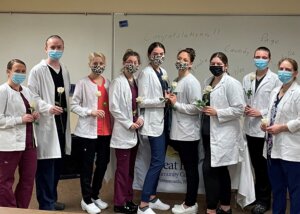 As the pandemic continues to pose unrelenting pressure on the nation’s healthcare workforce, Great Bay Community College is working closely with industry partners to prepare healthcare professionals to fill positions at a critical time.
As the pandemic continues to pose unrelenting pressure on the nation’s healthcare workforce, Great Bay Community College is working closely with industry partners to prepare healthcare professionals to fill positions at a critical time.
, said Bruce Vance, Program Manager for Healthcare Programs at Great Bay’s Business & Training Center. More than half were hired as apprentices into the program and had their tuition paid by their employers.
“The labor situation in New Hampshire has added pressure to our provider partners to stand out as an employer-of-choice for medical assistants,” Vance said. “Partnering with Great Bay—especially by offering registered apprenticeships—helps them provide a proven, structured, well-known path for their employees to become medical assistants at an accelerated pace and join the workforce quickly.”
The 12-week classes are offered year-round. Spring classes begin in April.
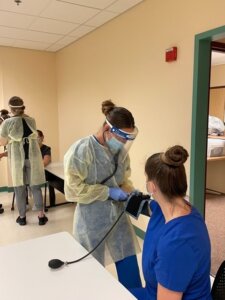 Medical assistants fill a variety of clinical and administrative roles in medical office and hospital settings. Great Bay developed the program in partnership with Core Physicians and Wentworth-Douglass Physician Corp. More recently, Lamprey Health Care joined in the effort.
Medical assistants fill a variety of clinical and administrative roles in medical office and hospital settings. Great Bay developed the program in partnership with Core Physicians and Wentworth-Douglass Physician Corp. More recently, Lamprey Health Care joined in the effort.
The program includes 320 hours of classroom instruction and hands-on lab experience, as well as 160 hours of practice and education in local medical offices. After completing the program and receiving their certificate from Great Bay, students are eligible to take the National Health Career Association Certified Clinical Medical Assistant exam.
The Great Bay program is successful because of the caliber of instructors, strong partnerships with providers, and the program structure, Vance said. “With eight weeks of full-time classroom instruction and four weeks of full-time externship as student-medical assistants with our provider partners, we teach them what they need to know to be successful,” Vance said. “This accelerated approach means that students have access to a high-demand occupation with great growth potential, whether it’s a start of a career or a career change, within less than 13 weeks.”
Charles D. Thomas, Director of Recruitment at Exeter Health Resources and Affiliates, which includes Core Physicians LLC, said the Great Bay partnership is essential in providing “a source of well-trained individuals in an extremely challenging labor market. Without this program, the challenges to fill our medical assistant labor needs would be even more difficult.”
During the externship with Core Physicians, the student-medical assistants accompany patients to exam rooms, take their vital signs, document aspects of the visit, and administer vaccinations and immunizations.
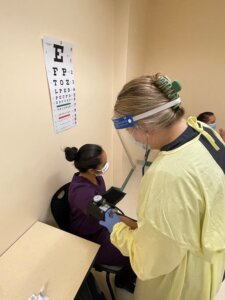 The partnership between Great Bay and Core Physicians began in 2015 and continues to evolve, Thomas said. Core Physicians interviews and hires people for the program as employees and pays them a training wage during the 12-week program. When they complete the program, the trainees are promoted into medical assistant roles.
The partnership between Great Bay and Core Physicians began in 2015 and continues to evolve, Thomas said. Core Physicians interviews and hires people for the program as employees and pays them a training wage during the 12-week program. When they complete the program, the trainees are promoted into medical assistant roles.
Beginning with the April class, Core Physicians will cover the full cost of the program. “The training program provides individuals interested in pursuing a career in healthcare with an entry point,” Thomas said. “The fact that trainees receive a training wage while in the program is a key component as it allows people to earn a living while learning a new career.”
Jody Pollack, Human Resources Director at Lamprey Health Care, said the Rochester healthcare provider began partnering with Great Bay in fall 2021 to help meet their clinical needs. “The need for medical assistants is greater than ever before,” she said. “Our first cohort started in September and have been in our offices for a couple of months. They are very prepared and are doing extremely well.”
Kendra Dow of Rochester enrolled in the program in September 2021, completed her externship at Rochester Hill Family Practice, and was hired soon after. She envisions the program as a steppingstone to a career as a nurse.
“The medical assistant program was a quick course, which was good for me because I am a single mom of two. I was able to take my courses and complete my externship while they were at school,” Dow said. “I liked the program because I was able to gain a better sense of the medical field, learn more in depth of what it entails, and I’m now able to work more hands-on while being able to document and work side-by-side with providers.”
Alannah Kunde graduated from the program in December 2015 and works at the Center for Wellbeing in Portsmouth. She also called the Great Bay program “the steppingstone I needed to start my career. I was very eager to join the workforce full time, and the speed of the accelerated program helped keep the finish line in sight.”
Beyond the partnerships, the quality of the professors and the program’s short duration, Vance said the soul and core success of the Medical Assistant Training Program is the diversity and commitment of the students. “Our students range in age from 19 into their 50s. Their backgrounds may or may not be in healthcare. We see those who have earned their GED and those who have earned their bachelor’s degree and plan on pursuing a career as doctor or physician’s assistant,” he said.
“The most successful students, regardless of background or experience, are those who are passionate about helping people, motivated to enter a career that is quickly changing, and understand the importance of the medical assistant role in the larger healthcare setting.”
For more information about the program, schedule of Info Sessions or other allied health training opportunities, visit www.greatbay.edu/MA or contact [email protected] or call 603-427-7653.
Great Bay Community College is a comprehensive postsecondary institution offering quality academic and professional and technical education in support of workforce development and lifelong learning. Great Bay Community College is part of the Community College System of New Hampshire, a public system of higher education consisting of seven colleges in Berlin, Claremont, Laconia, Concord, Manchester, Nashua, and Portsmouth. The colleges offer Associate degrees and career training in technical, professional and general fields, including transfer pathways to baccalaureate degrees. For more information on Great Bay Community College, visit www.greatbay.edu.
This fall, Great Bay will be welcoming its 27th cohort since the program began in 2015.
PORTSMOUTH – Great Bay Community College will welcome its next cohort of medical assistant students beginning Sept. 26. This marks the 27th cohort since the program began in 2015. Twelve weeks later, those students will be gainfully employed in medical office and hospital settings across the Seacoast.
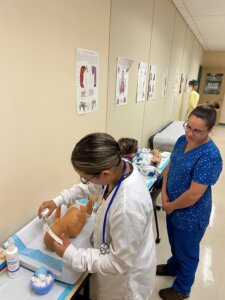 “The demand for medical assistants far outstrips the supply,” said Bruce Vance, Program Manager for Healthcare Programs at Great Bay’s Business and Training Center, which administers the Medical Assistant Training Program.
“The demand for medical assistants far outstrips the supply,” said Bruce Vance, Program Manager for Healthcare Programs at Great Bay’s Business and Training Center, which administers the Medical Assistant Training Program.
Laurie Merrick, who helps recruit students for the popular program in her role as Business and Training Center assistant, said many students are offered jobs directly from their externships. “If someone signs up for the September class, they will be employed and have a new career by the end of the year,” Merrick said. “We are constantly getting requests for our medical assistant students.”
Medical assistants record and update medical histories and contact information of patients, schedule appointments and draw blood, check vital signs, and collect lab samples. They are often the medical professional a patient interacts with in an exam room before the doctor, collecting information about the patient to help the doctor prepare for the exam. They must have good technical and interpersonal skills and be detailed-oriented.
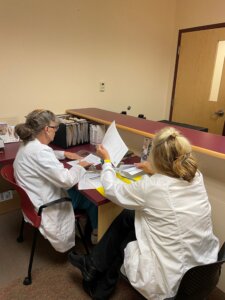 Students who successfully complete the Great Bay program will be versed in medical terminology, human anatomy and physiology, technical aspects of phlebotomy, pharmacology, cardiac life cycle, the proper use and administration of medications, how to obtain and document vital signs, and how to access and record information in electronic medical records.
Students who successfully complete the Great Bay program will be versed in medical terminology, human anatomy and physiology, technical aspects of phlebotomy, pharmacology, cardiac life cycle, the proper use and administration of medications, how to obtain and document vital signs, and how to access and record information in electronic medical records.
The program includes 320 hours of classroom instruction and hands-on lab experience, as well as 160 hours of practice and education in local medical offices. After completing the program and receiving their certificate from Great Bay, students are eligible to take the National Health Career Association Certified Clinical Medical Assistant exam. Historically, more than 90 percent of Great Bay students are employed immediately after completing the program, and that percentage is higher now because of demand and historically low unemployment rates.
Up to two-thirds of the students participating in the program are hired as apprentices with their tuition paid by their employers. Great Bay has partnerships with Lamprey Healthcare, Greater Seacoast Healthcare, Appledore Medical Group, Wentworth Douglass Hospital, and others.
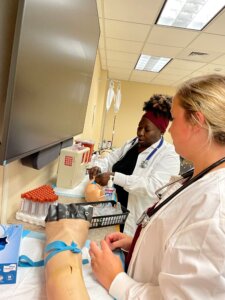 “These partnerships are very valuable, as they represent a win-win scenario,” Vance said. “Great Bay wins because it’s a boost to our enrollment, and our partners win because they don’t need to compete for a very limited number of medical assistants. And most importantly, the students win because they know they have a job upon completion of our program.”
“These partnerships are very valuable, as they represent a win-win scenario,” Vance said. “Great Bay wins because it’s a boost to our enrollment, and our partners win because they don’t need to compete for a very limited number of medical assistants. And most importantly, the students win because they know they have a job upon completion of our program.”
Lauri Smith of York, Maine, is currently enrolled in the program through a Great Bay’s partnerships and will begin her new career in September. “I am starting a new chapter in my life, and Great Bay and has given that to me,” said Smith, 58, who moved to area from Illinois to care for her aging parents. “I have a whole other lifetime left. It’s a win-win, and so much more than I expected.”
After being away from school for more than 20 years, she has found Great Bay to be accommodating and supportive. “I can’t say enough about Great Bay. The instructors, the staff, they have all been great. If you have a question, they answer it. If you have confusion, they clear it up,” Smith said. “Everyone is positive and welcoming, and I feel blessed to be here – and I want to do better because of that.”
Alannah Kunde completed the Great Bay program in 2015 and now works as a medical assistant at the Center for Wellbeing in Portsmouth. “Great Bay was the steppingstone I needed to start my career. I was very eager to 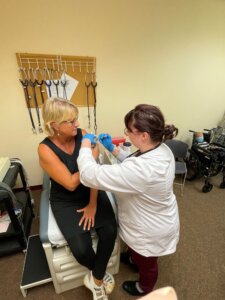 join the workforce full time, and the speed of the accelerated program helped keep the finish line in sight. When you attend class for 40 hours a week, you build a close relationship with your teachers and classmates. It always felt like our teachers were rooting for us and were proud of us. For me, this was huge because I always felt supported and knew I had the tools I needed to succeed,” she said.
join the workforce full time, and the speed of the accelerated program helped keep the finish line in sight. When you attend class for 40 hours a week, you build a close relationship with your teachers and classmates. It always felt like our teachers were rooting for us and were proud of us. For me, this was huge because I always felt supported and knew I had the tools I needed to succeed,” she said.
Kendra Dow of Rochester enrolled in the program in September 2021, completed her externship at Rochester Hill Family Practice, and was hired soon after. She envisions the program as a steppingstone to a career as a nurse.
“The medical assistant program was a quick course, which was good for me because I am a single mom of two. I was able to take my courses and complete my externship while they were at school,” Dow said. “I liked the program because I was able to gain a better sense of the medical field, learn more in depth of what it entails, and I’m now able to work more hands-on while being able to document and work side-by-side with providers.”
Vance said the soul and core success of the Medical Assistant Training Program is the diversity and commitment of the students. “Our students range in age from 19 into their 50s. Their backgrounds may or may not be in healthcare. We see those who have earned their GED and those who have earned their bachelor’s degree and plan on pursuing a career as a doctor or physician’s assistant,” he said.
For more information about the program, schedule of Info Sessions or other allied health training opportunities, visit www.greatbay.edu/MA or contact [email protected] or call 603-427-7653.
Great Bay Community College is a comprehensive postsecondary institution offering quality academic and professional and technical education in support of workforce development and lifelong learning. Great Bay Community College is part of the Community College System of New Hampshire, a public system of higher education consisting of seven colleges in Berlin, Claremont, Laconia, Concord, Manchester, Nashua, and Portsmouth. The colleges offer Associate degrees and career training in technical, professional and general fields, including transfer pathways to baccalaureate degrees. For more information on Great Bay Community College, visit www.greatbay.edu.

